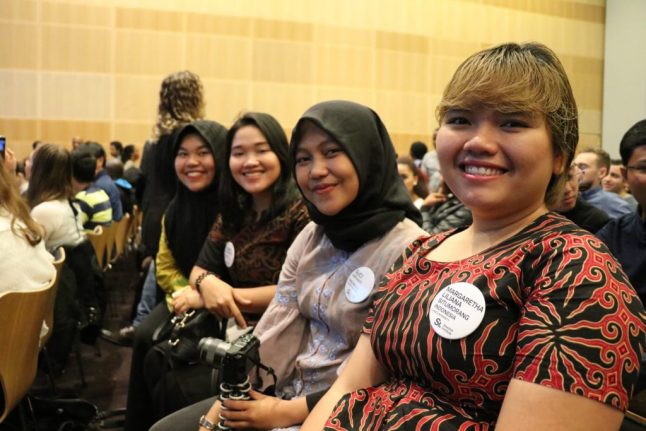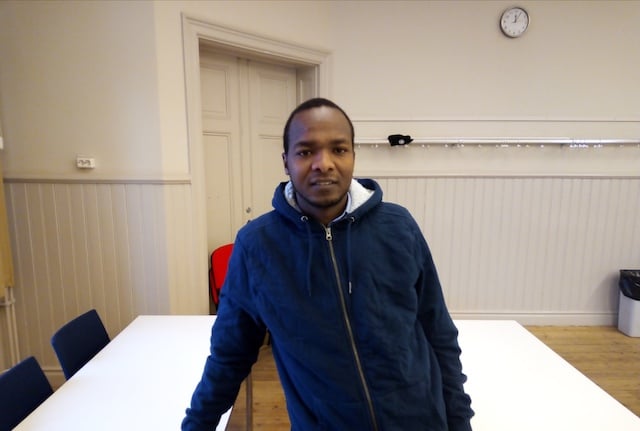This year’s NFGL scholars gathered in Stockholm last weekend for the SI Kick-Off at the Clarion Sign hotel.
Photo: David Landes
Inside, the day started with a presentation from the Swedish Institute, with Madeleine Mattsson, project manager at NFGL and Linnéa Lindgren, project manager for the SI alumni network.
 Photo: Kamber Güler
Photo: Kamber Güler
Kurt Bratteby, head of the international relations department for SI, followed in welcoming the students. He offered advice and a great quote from his “hero” Dag Hammarskjöld, a Swedish national and former UN Secretary General from 1953 until his death in 1961.
“Never measure the height of a mountain until you have reached the top. Then you will see how low it was.”
 Photo: Kamber Güler
Photo: Kamber Güler
And, of course, we were there! SI News got to the stage to present the SI News Service, the newsletter, and website. We also invited you all to write for SI News, and some of you already came up with great suggestions. Keep them coming!
Oh and we took this picture from up there:
Photo: David Landes
After us came Liridona Sopjani. You already know her from last week’s interview with her on the newsletter. We know SI News is a tough act to follow, but she did a great job and gave a very moving presentation.
 Photo: Kamber Güler
Photo: Kamber Güler
After a busy start of the day, the time we were all waiting for: fika!
NFGL member and Kick Off attendee, Kamber Güler, who is studying for his PhD at Linköping University’s campus in Norrköping shared some of his thoughts about Sweden’s famous fika, which he calls “one of Sweden’s indispensabilities”.
“Did you know that Sweden is the country that consumes the most coffee in the world after Finland? And did you know that it is one of the countries with the greatest number of scientists in the world compared to the population?
“They even say that if you want to flirt with a Swedish girl or boy, invite her to a fika and do not attempt to drink lemonade instead of coffee; otherwise, you may lose it from the very beginning!”
 Photo: Eugenia Tanaka
Photo: Eugenia Tanaka
 Photo: Eugenia Tanaka
Photo: Eugenia Tanaka
 Photo: Eugenia Tanaka
Photo: Eugenia Tanaka
 Photo: Eugenia Tanaka
Photo: Eugenia Tanaka
 Photo: Kamber Güler
Photo: Kamber Güler
When we were all happy and ready for the next round, John Alexander came onstage to tell us all about Swedish culture, and how to adapt to life in the country. His presentation was a crowd favourite, and had us all laughing.
Scholar Kamber Güler called it “one of the most fascinating sessions of the day”, and said Alexander made him feel “there is a very entertaining side of the adaptation to the new people and the relevant new culture in a new country.”
 Photo: Kamber Güler
Photo: Kamber Güler
Alexander also encouraged a lot of discussion between the scholars.
 Photo: Kamber Güler
Photo: Kamber Güler
After such an energetic presentation, we all went outside for lunch, kindly provided by the Swedish Institute. The meal was vegetarian for environmental reasons, and everyone seemed to enjoy it.
 Photo: Eugenia Tanaka
Photo: Eugenia Tanaka
 Photo: Eugenia Tanaka
Photo: Eugenia Tanaka
 Photo: Eugenia Tanaka
Photo: Eugenia Tanaka
 Photo: Eugenia Tanaka
Photo: Eugenia Tanaka
 Photo: Eugenia Tanaka
Photo: Eugenia Tanaka
 Photo: Eugenia Tanaka
Photo: Eugenia Tanaka
 Photo: Eugenia Tanaka
Photo: Eugenia Tanaka
 Photo: Eugenia Tanaka
Photo: Eugenia Tanaka
 Photo: Eugenia Tanaka
Photo: Eugenia Tanaka
After lunch, the outgoing Chairs of NFGL Local Networks told scholars about the importance of becoming engaged with the local networks, and how to make the most of the experience.
On stage were Anup Benerjee from the Jönköping local network, Kanaan Manasrah from the Stockholm Innovation and Tech local network, Marcela Miranda Francisco from the Linköping local network, and Myroslava Zaiets from the Stockholm Media and Human Rights local network.
 Photo: Eugenia Tanaka
Photo: Eugenia Tanaka
They gave some great advice to new scholars:
“There are a lot of things to embrace, and a lot of things to enjoy. Välkomma”, said Banerjee.
“It is really important to have a network, to build professional and academic connections. In Sweden, that is very important professionally”, said Manasrah, who also went on to say: “Don’t be afraid of this winter talk. As Swedes say, ‘There’s no such thing as bad weather, only bad clothes’.”
“Make the most of your time in Sweden, and take advantage of this beautiful country”, said Francisco.
Zaiets gave some really practical advice for those planning events with their local networks:
“It is really embarrassing when you have five people show up from your 25 people list, and your speaker is looking at you and you have to say ‘You know, it’s exams week…’. I’ve been there. So it’s important to keep sending reminders and ask people to tell you in case they can’t make it.”
After an afternoon fika break, two parallel sessions were held. One with Mia Crawford, Deputy Director for Global Agenda at the Swedish Ministry of Foreign Affairs, on the Agenda 2030; and one with Peter Lundkvist, from Stockholm University, who gave an introduction to the Swedish language.
Crawford underlined the Swedish government’s approach to the Agenda 2030, in line with its feminist foreign policy.
Lundkvist made an impression on our contributor Güler, who recalls he “showed us what a harmonious and musical language this Scandinavian country actually has. Swedish language is like a song, like a poem.”
Special thanks to scholar Kamber Güler from Turkey, studying a PhD in Social and Political Sciences at Linköping University, for contributing with pictures and comments from his article about the kick-off.



 Please whitelist us to continue reading.
Please whitelist us to continue reading.